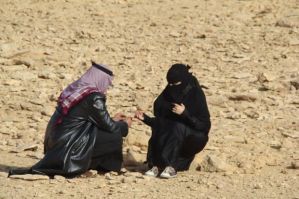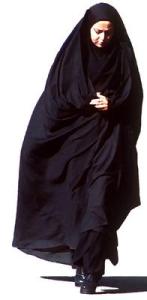 In the name of Allah, the Most Compassionate, the Most Merciful
In the name of Allah, the Most Compassionate, the Most Merciful
‘Why does it matter whether we wear the hijab? These are outward acts. Allah looks into our hearts.’ This is what some of our sisters say. They often mention the words of the Messenger of Allah – upon him be peace – :
Allah does not look at your outward appearances and not at the forms of your actions; but verily He looks into your hearts (Muslim 2564)
He – peace be upon him – said in another hadith:
Actions are judged by intentions. (Nawawi 1)
Therefore, what these sisters say is true. There is nothing more important than our intentions. If an action is not accompanied with pure intention, the action will not accompany us when we leave this world. Outward action, even though not sufficient, is necessary. We live in this world and we cannot do without action.
The prayer (Salât), the fasting of Ramadan (Sawm), the paying of the poor-due (Zakât), the pilgrimage to the Holy House (Hajj) and the recitation of the Book of Allah (talâwat-al-kitâb) are all forms of worship. They are all external acts that involve the body. However, their effect is the purification of the heart. As Al-Ghazzâli writes in his Ihyâ:
‘Intention (niyyah) is to action (‘amal) what the soul is to the body. A body that has no soul is a corpse. And a soul that has no body cannot manifest itself in this world.
Therefore, this is something we should think about: Why are we wearing the hijab or the niqab or any other form of Islamic modest dress? What is our intention? If I wear the hijab because other women in my family or society wear the hijab, – and for no other reason –, I will enjoy only the social and outward benefits of hijab. If I wear the hijab for Allah, I will receive my reward also from Allah.
Everything that a Muslim man or woman does: he or she should do it sincerely for Allah. The hijab is no exception. If we wear the hijab for Allah, the hijab itself becomes a form of worship: a devotional act which aims at the purification of our hearts.
Secondly, what do we consider the hijab to be? Do we look at it as a burden or as something imposed on us by men or by the patriarchal society? Or do we think of it as a way of spiritual development and as a blessing from Allah? The women of the earlier generations did not consider the hijab to be a burden. Let us consider Umm Salamah – May Allah be pleased with her -:
Umm Salamah asked her husband, the Messenger of Allahpbuh: ‘How should we trail the hem of our garments?’ He said: Trail it by a hand span. She said: ‘But the feet may become uncovered!’ He said: ‘Then trail it a forearm’s length; and do not exceed that.’ (Abu Dawūd 4105)
Many of the jurisprudents infer from this hadith that a woman must also cover her feet. I am not going to delve into fiqhi issues here. There is a subtle point in this hadith: Umm Salamah convinced the Prophet – peace upon him – that a ‘hand span’ is not enough; and the Prophet – peace be upon him – had to change his opinion. Why did the Messenger of Allah – peace be upon him – feel it was necessary to say: ‘but do not exceed that’? Was this not because Umm Salamah and the other wives of the Prophetpbuh were so eager to cover themselves?
Another example, this time from the female companions:
Thabit Bin Qays narrated: A woman called Umm Khallad came to the Prophet – peace be upon him – and she was veiled. She was searching for her martyred son.One of the companions of the Prophet – peace be upon him- said to her: ‘You have come here asking for your son while veiling your face?’
She said: “Now that I have lost my son, I will not lose my modesty.” (Abu Dawȗd, 2482)
Was Umm Khallad covering her face because she was forced by a man? No! Her husband, ‘Amr ibn Al-Jamuh, had been killed in the battle of Uhud. Now, her only son Khallâd was also killed by the People of the Book! Did the companions force her to wear the niqab? No, as the hadith also indicates. She was wearing it to preserve her modesty which was as dear to her as her own son.
We can also see this attitude towards hijab in the women of the Tabi’een. Hafsah bint Sireen, for example, covered her face with her jilbâb even when she was an elderly woman and the hijab was not obligatory upon her.[1]
Furthermore, the hijab does not symbolise a woman’s subservience to men. It symbolises a woman’s subservience to her Creator.  The proof is that a woman must wear the hijab regardless of what her husband says. If a husband tells his wife to remove her hijab, she has every right to disobey her husband. In Islam, it is unlawful to obey a created being in what opposes Allah’s laws and the laws of feminine honour and decency. In the Bible, we also read that Queen Vashti disobeyed her husband to preserve her dignity and self-respect. If Vashti were a virtuous Muslim woman, she would do the same: she would prefer her modesty to her royal crown.
The proof is that a woman must wear the hijab regardless of what her husband says. If a husband tells his wife to remove her hijab, she has every right to disobey her husband. In Islam, it is unlawful to obey a created being in what opposes Allah’s laws and the laws of feminine honour and decency. In the Bible, we also read that Queen Vashti disobeyed her husband to preserve her dignity and self-respect. If Vashti were a virtuous Muslim woman, she would do the same: she would prefer her modesty to her royal crown.
Again, some Westerns have written that the hijab is a reflection of the idea that women are the property of men. Firstly, the idea that a woman is the property of her husband is a Western idea. We can find this in Shakespeare’s plays. Petruchio says, referring to his wife:
She is my goods, my chattels;
she is my house, my household stuff.
The Shari’ah makes it clear: men should not treat women as their property. Marriage is a contract between two people. The husband has certain rights and responsibilities. The wife has certain rights and responsibilities. A woman does not belong to her husband in the way that a house belongs to a man. Man and woman belong to one another, in the same way that body and soul belong to each other. The body veils the soul and the soul animates the body. This is how the Qurán describes the relationship between husband and wife:
They (your wives) are your garments and ye are their garments. (2:187)
The commentators mention that our garment is the closest thing to us, after our body. Likewise, our spouse must be the one closest to us after Allah and ourselves. And Allah knows best!
[1] Narrated ‘Aasim al-Ahwal: We went to Hafsah bint Sirīn and she had put on her jilbāb and covered her face with it. We said to her: May Allah have mercy on you! Does not Allah say: “And as for women past childbearing who do not expect wedlock, it is no sin on them if they discard their outer clothing in such a way as not to show their adornment” [24:60] She said: Yes. And what comes after that? We replied: “But to modestly refrain from that is better for them.” She said: “It means to keep the jilbâb.’ (Bayhaqi 7/93)




